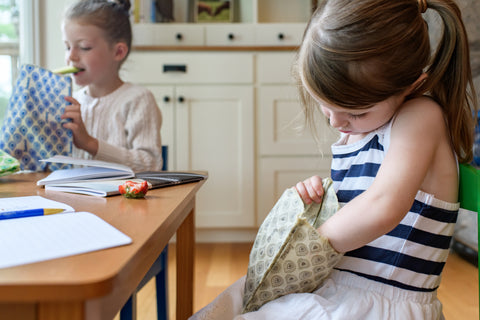
SNACK GREEN!
Ditch Plastic Bags
Switching to a more environmentally-friendly lifestyle does not happen overnight and usually occurs in small steps. First, you may reduce plastic consumption when shopping, then switch to plastic-free cleaning supplies, and so on.
What about the even smaller decisions like plastic snack bags? It seems like a neglectable amount of plastic to worry about but once you look at the statistics, you'll see that it's not. It is estimated that the average North American household uses over 500 zip-locked bags annually and for the most part, these bags are used only once and end up in landfills for hundreds of years to come.

Keep reading to find out 7 reasons you should ditch plastic snack bags.
1. Single-Use Plastic Uses Significant Resources
All plastic is made using non-renewable crude oil, gas, and coal. As a result, more than 850 million metric tons of greenhouse emissions were released into the environment last year alone.
This is due to extracting fossil fuel, transporting, refining, manufacturing, and shipping plastic products.
Excessive greenhouse emissions (mainly carbon dioxide) cause real problems on earth. They allow radiation from the sun to come into our environment but don't allow infrared radiation to leave. This creates a greenhouse effect, causing the temperatures on our planet to rise, which becomes inhospitable for most forms of life.
The biggest contributor to greenhouse emissions is the burning of fossil fuels, which are used for many day-to-day things, including the production of plastic.
Although plastic snack bags aren't responsible for the entirety of this, they take up a fair share of it because of their popularity.
2. Plastic Bags Are Mass Produced
Small bags are used for convenience. They allow you to store unused food and bring snacks wherever you go.
This is why at least 1.105 billion plastic sandwich bags in the U.S. alone are consumed each week. That's an unfathomable number and only includes one country's consumption. The majority of these bags come from people who only have a handful every week, too.
The number is so high because realistically, plastic sandwich bags are single-use products.

3. Plastic Snack Bags Are Only Useful Once
After they've held sandwiches, chips, and snacks of all varieties, plastic snack bags often end up in the waste bin. They simply aren't made to be reused.
You can't put them in the dishwasher. Hand washing them is difficult without ripping the bag. Plus, their design tends to lock in moisture, meaning mold can grow in them.
4. Plastics Aren't Biodegradable
Although plastics are made using natural resources, they can't biodegrade due to the chemical processing they've undergone.
Plastic snack bags are typically made of #2 (high-density polyethylene) or #4 (low-density polyethylene) plastic. They are technically recyclable but many plants don't take them due to the fact that they're so small that they can damage equipment.
Plus, they can't be accepted if they are torn or ripped. The sealing zipper itself isn't recyclable at all.
As a result, many plastic bags end up in landfills, or worse -- they float away into nature. They don't disappear, even after hundreds of years. They break into smaller pieces known as microplastics.
These microplastics pollute the environment, end up in animals' digestive tracts, and can even end up in our bodies. So, these single-use items end up being forever pollutants in our world.

5. Wildlife is Harmed By Plastic Snack Bags
Aside from fragmenting into microplastics, plastic snack bags harm wildlife in other ways.
When they end up in nature, animals can mistake them as food. You've probably seen the unfortunate pictures of sea turtles trying to consume plastic. This happens because plastic bags look similar to jellyfish and other aquatic lifeforms.
Even after these sad scenarios occur, the plastic snack bags don't disappear. They continue making rounds across the world until they get stuck on something and remain there until they fragment into microplastics.
Roughly 4.8 to 12.7 million tons of plastic end up in our oceans, annually. There are literal islands of waste floating around, harming wildlife and releasing toxins into our waterways.
6. All Plastic Leaches Harmful Toxins
Plastic snack bags don't just hurt wildlife. They hurt us, too.
All plastics (even the ones deemed as "safe") degrade in natural light, heat, and moisture-filled environments. As a result, they leach estrogenic chemicals.
What exactly are estrogenic chemicals? They are compounds that imitate hormones like estrogen. They are proven to cause a wide variety of health problems, including reduced sperm counts, obesity, and increased rates of cancer.
In this study, 70% of the plastics used, leached these chemicals before undergoing stress degradation. This shows that even in optimal settings, plastics release harmful chemicals.
7. You Have Better Options
With all of these negative facts, it's important to stay positive and remember that you have power as a consumer.
Instead of using plastic snack bags, you can purchase reusable beeswax wrap bags to store your food. These products are naturally breathable and are proven to allow food to last longer than their plastic counterparts.
It seems like a small action but it isn't when you consider the fact that plastic bags never really go anywhere after they're created. They stay on earth and continue harming it.
You can do your part by making the small switch from plastic snack bags and then working towards reducing other forms of plastic in your life.
These actions can make a huge impact. Companies make their decisions based on consumer choices. This means that as the trend to go green continues, fewer companies will produce plastic-laden products.
Make the Switch
Now that you are fully convinced about saying goodbye to plastic snack bags forever, you can make the switch to help change the world.
Keep learning about the harms of plastic so that you can be informed and make informed decisions. Then, you can encourage friends and family to do the same.
Shop our alternative, reusable beeswax wrap bags to make a difference.
